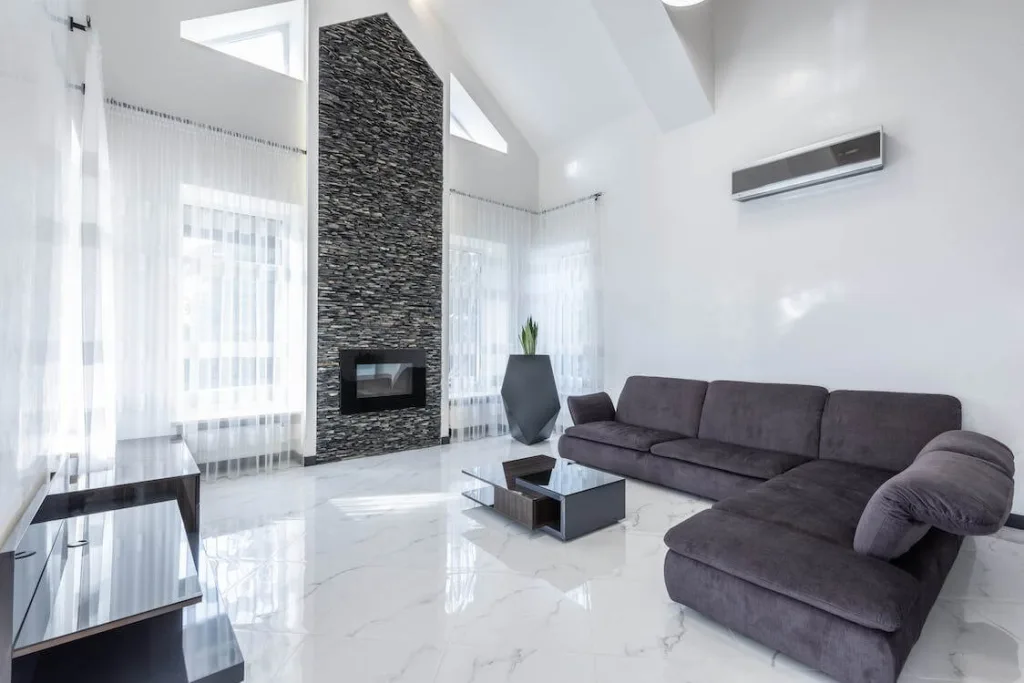Benefits Of Proper Installation
Proper HVAC system installation is essential to ensure improved indoor air quality. When done correctly, the benefits can be great. Here are five of the main advantages:
1. Improved Air Quality
Properly installed HVAC systems help keep airborne pollutants and allergens out of your home or office space, leading to better overall health for those breathing the air.
2. Increased Comfort
By controlling humidity levels, a properly installed HVAC system helps maintain consistent temperatures in the environment so that occupants feel comfortable all year round.
3. Lower Energy Bills
Installing an energy-efficient unit helps reduce electricity costs by using less power than traditional units. This results in lower monthly bills over time.
4. Reduced Maintenance Costs
A well-installed unit requires less maintenance due to fewer breakdowns and repairs over its lifespan than other heating and cooling solutions.
5 . Longer Lifespan
An efficiently functioning system will last longer as it is not exposed to unnecessary wear and tear from improper use or incorrect settings on controls.
These are just some benefits of proper air conditioning installation to improve indoor air quality and comfort in any living space or workplace environment. With these benefits comes peace of mind knowing that occupants’ health is being taken care of and they can enjoy their spaces feeling safe and healthy all year round without worrying about expensive energy bills or costly repair works down the line.
Factors Affecting Quality Of Indoor Air
It is necessary to understand the various factors that influence indoor air quality. If not properly managed, airborne pollutants such as smoke, pet dander, and dust mites can contribute to poor air quality. Additionally, HVAC system installation must be done correctly to achieve a ventilation rate for optimal air temperature and humidity levels.
The ventilation rate of an HVAC system determines how often fresh outdoor air enters a building or home interior. If it’s too low, stale indoor air can become trapped inside and cause airborne pollutants to accumulate. Therefore, the role of HVAC system installation must consider air quality and energy efficiency goals.
Poorly maintained HVAC systems can diminish indoor air quality even with the correct initial installation. Regular maintenance should include filter changes, coil cleaning, and ductwork inspections to ensure no contaminants have accumulated over time. These preventive measures will help reduce airborne pollutant concentrations while ensuring maximum energy efficiency from your installed system.
Dangers Of Poor Indoor Air Quality
Poor indoor air quality can have serious health implications. Therefore, it’s essential to be aware of the potential dangers posed by pollutants present in the home or workplace — indoor-air pollutants, such as dust and pet dander, cause respiratory illnesses. Furthermore, gases released from building materials can lead to various ailments, including allergies, headaches, and irritations.
It is essential to assess the air quality within a space using air-quality tests that measure levels of contaminants to ensure safety standards are met. These include ventilation rates, temperature ranges, and humidity measurements. If these regulations are adhered to, it could result in better air quality.
Symptoms of poor air quality may not always be obvious at first but can become more apparent over time if left untreated. Common signs include feelings of fatigue, irritation of the eyes, nose, and throat, as well as difficulty breathing, amongst others. In severe cases, long-term exposure can exacerbate conditions like asthma or even lead to chronic diseases such as cancer – making regular HVAC system maintenance vital for ensuring adequate indoor air quality throughout any given property.
Types of HVAC Systems For Home Use
When it comes to home HVAC systems, several different types are available. The most common type is the split system, which consists of an outdoor unit and an indoor air handler that connects through ductwork. This system can be installed in homes with existing ductwork or new construction.
Another popular option is a ductless system, which uses multiple wall-mounted blower units connected to an outside condenser. These systems are great for cooling individual rooms or spaces without installing additional ductwork.
Geothermal systems are also becoming increasingly popular as homeowners seek more efficient options. With these systems, water circulates through underground pipes to extract energy from the earth’s natural heat sources and then transfers it indoors to provide heating and cooling.
Multi-split systems are similar to standard split systems, but they have multiple indoor units connected to one outdoor condenser, allowing you to control specific areas independently from each other. And finally, window AC units are still an option for those who don’t want a full installation; this type of system is relatively easy and inexpensive compared to its counterparts.

Professional Installation Considerations
Hiring a professional HVAC contractor is the only way to ensure your HVAC system is properly installed. While some homeowners may be tempted to do their installations to save money or time, this can seriously affect air quality standards and energy efficiency. Therefore, you’ll want to hire a qualified contractor with experience installing and servicing these systems for optimal results.
When selecting a contractor for your air conditioning installation in Sarasota, look for someone certified and insured so they can handle potential issues during the process. They should also provide references from past customers so you can confirm their qualifications. Finally, ask whether they offer warranties on parts and labor and guarantee the job will be completed according to industry standards.
Make sure the contractor performs a load calculation before beginning work; schedule regular maintenance appointments; use proper insulation materials; choose high-quality filters that meet local regulations; check ductwork for leaks before start-up; maintain manufacturer’s recommended airflow levels; ensure good ventilation throughout the home; keep registers clean and unobstructed at all times. By following these simple yet effective guidelines, you can rest assured your HVAC system will be successfully installed and help improve indoor air quality quickly!
Conclusion
The role of HVAC system, including AC installation in Sarasota can’t be overstated. Not only does it improve air quality and reduce pollutants in the home, but it also saves energy costs and optimizes comfort levels. Therefore, it’s essential to consider all factors that affect indoor air quality before making an informed decision when selecting a system for your home.
At Tropic Air Conditioning, we ensure you get the most out of your investment by guaranteeing quality workmanship and reliable performance from start to finish. Be sure to check out some ac installation tips that expands on this other related idea. Contact us today




